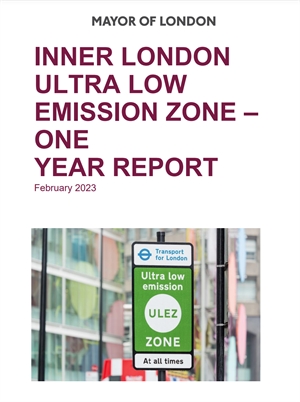New report finds London's ULEZ expansion led to sharp reduction in emissions
Sat 11 February 2023
View all news

A new report for the Mayor of London found that emissions of harmful pollutants reduced by 26 per cent within the expanded ULEZ area in central London compared with what would have occurred without the regulation.
It also shows that the ULEZ has reduced pollution levels in central London overall by nearly half compared to what they would have been without the scheme.
Scientists at Imperial College London worked alongside the Mayor’s team on the evidence base for the ULEZ design and to assess how well it is working. The report uses the same methodology to assess the impacts of the scheme as used in the previous ULEZ impact assessment reports – all of which underwent independent peer review.
In preparation for the further expansion of the ULEZ this summer, the Mayor has launched a further scrappage scheme worth £110m to support businesses, charities, Londoners on lower incomes and disabled Londoners to replace their old, heavily polluting vehicles with greener options. This comes on top of the £61m scrappage scheme launched in 2019.
Despite significant progress, the whole of London still exceeds the World Health Organization’s guidelines for air quality, and over half of deaths attributable to air pollution are in outer London.
The Mayor of London, Sadiq Khan said: “The evidence from this landmark report is clear – the ULEZ works. This is beyond dispute. It has already reduced toxic air pollution by almost half in central London and by over a fifth in inner London, transforming the quality of air for four million Londoners.
“But there’s still more to do. Toxic air is a matter of life and death, with around 4,000 deaths in London attributed to air pollution in 2019. It’s also stunting the growth of children’s lungs and causing people to develop life-changing illnesses, such as cancer, lung disease, dementia and asthma.
“With the majority of deaths attributable to air pollution in outer London, it’s vital that we expand the ULEZ London-wide. As Mayor, I simply won’t accept that the five million people in outer London shouldn’t be able to benefit from the same life-saving health impacts that ULEZ has already brought to the rest of our city. Everyone has the right to breathe clean air.”
Dr Gary Fuller, air pollution scientist from Imperial College London’s Environmental Research Group, and UKRI Clean Air Champion said: “Scientists at Imperial College London worked alongside the Mayor’s team on the evidence base for the ULEZ design and to assess how well it is working.
“The 10th anniversary of the death of Ella Kissi Debrah is a powerful reminder of the impacts of air pollution on London’s children and young people; especially those living, travelling or at school close to major roads. The central London ULEZ, and its extension to inner London, has bought about measurable and sustained improvements to air pollution from traffic.
“Many people fear that traffic will simply divert around low emission zones, worsening air pollution for those that live on the boundaries. However, data from London’s air pollution measurement network has shown that this has not happened. Instead, nitrogen dioxide alongside the North and South Circular roads has shown a strong improvement.
“Many cities in the UK and around the world are looking to follow London’s lead. I hope that the evidence here will improve the design of similar schemes more widely.”
Studies have shown that around 4,000 Londoners die prematurely every year due to the levels of harmful air pollution.
The ULEZ was introduced in central London in 2019 and expanded to inner London in October 2021.
Related Links
< Back to news list